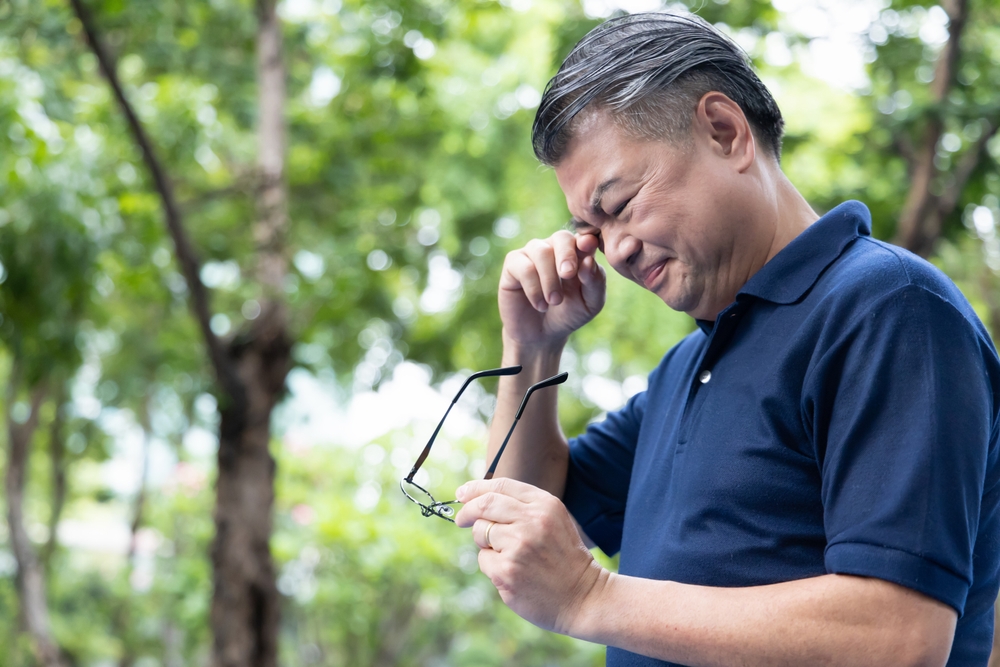Glaucoma is a group of eye disorders that can silently steal your vision if left untreated. It’s often called the “silent thief of sight” because it rarely has noticeable symptoms in its early stages.
As a leading cause of irreversible vision loss, understanding glaucoma and its impact on vision is crucial for maintaining eye health. Keep reading to learn more about glaucoma, including what part of the vision it typically affects!
What is Glaucoma?

Glaucoma is a condition that damages the optic nerve, which is responsible for transmitting visual information from the eye to the brain. The most common form of glaucoma is called primary open-angle glaucoma, also called POAG for short.
In POAG, the drainage channels in the eye gradually become clogged, leading to increased pressure within the eye, known as intraocular pressure or IOP. Over time, this elevated pressure can damage the optic nerve fibers, causing vision loss.
Can Glaucoma Cause Vision Loss?
Glaucoma can lead to vision loss if not detected and treated early. The damage caused by glaucoma is usually gradual and often painless, which is why many people don’t realize they have the condition until significant vision loss has already occurred.
As the optic nerve deteriorates, blind spots develop in the visual field. If glaucoma remains untreated, these blind spots can grow larger, eventually leading to tunnel vision and, in severe cases, complete vision loss.
What Part of The Vision Does Glaucoma Affect First?
Glaucoma typically affects peripheral vision first. Peripheral vision is the ability to see objects and movement outside of your direct line of sight.
As glaucoma progresses, it slowly changes peripheral vision, causing blind spots to develop in the outer edges of the visual field. This is why people with glaucoma may not notice vision changes until the later stages of the condition, when central vision becomes affected.
In the early stages, a person with glaucoma might bump into objects or miss things in their side vision without realizing there’s an issue. As the condition advances, the visual field continues to narrow, making it difficult to navigate daily life without bumping into objects or missing steps.
Is Vision Loss From Glaucoma Permanent?
Unfortunately, any vision loss caused by glaucoma is permanent and cannot be reversed. The optic nerve fibers, once damaged, cannot be revived.
This is why early detection and treatment are so important. While vision lost to glaucoma cannot be restored, prompt treatment can halt or slow the progression of glaucoma, preserving your remaining vision.
Treatment for glaucoma typically involves lowering the intraocular pressure through eye drops, oral medications, laser treatments, or surgical procedures. By reducing the pressure within the eye, further damage to the optic nerve can be prevented, and the risk of additional vision loss is reduced.
How Do I Know If I Have Glaucoma?

Regular comprehensive eye exams with your eye doctor at Blaine Eye Clinic are the best way to detect glaucoma, especially in its early stages when vision loss is not yet noticeable. During these exams, your eye doctor will measure your intraocular pressure, inspect the drainage angle of your eye, evaluate your optic nerve for any signs of damage, and test your visual field.
Some people are at a higher risk of developing glaucoma, including those over age sixty, individuals with a family history of glaucoma, people with diabetes, and those who are severely nearsighted. If you fall into any of these high-risk categories, it’s essential to have your eyes examined more frequently.
If you experience any sudden changes in vision, such as blurred vision, halos around lights, or loss of peripheral vision, it’s crucial to consult your eye doctor immediately. These could be signs of acute angle-closure glaucoma, a rare but serious form of glaucoma that requires immediate medical attention.
How is Glaucoma Treated?
If you are diagnosed with glaucoma, your eye doctor will develop a treatment plan right away to help lower your eye pressure. In some cases, your eye doctor at Blaine Eye Clinic may refer you to a glaucoma specialist, depending on the severity of the condition.
There are many treatment options for glaucoma, ranging from eye drops to glaucoma surgery. If you are diagnosed with glaucoma, it is very important to see your eye doctor regularly so they can monitor your eyes for any vision changes or further damage to the optic nerve.
Don’t Let Glaucoma Steal Your Sight!

Glaucoma is a serious eye condition that can lead to irreversible vision loss if not detected and treated early. By understanding how glaucoma affects vision and the importance of regular eye exams, you can take proactive steps to protect your vision.
If you are at a higher risk for glaucoma or notice any changes in your vision, don’t hesitate to schedule an appointment with your eye doctor. With prompt diagnosis and appropriate treatment, you can preserve your vision and maintain your quality of life in the face of glaucoma.
Do you want to learn more about glaucoma or have your eyes checked? Schedule an appointment at Blaine Eye Clinic in Blaine, MN, today!





